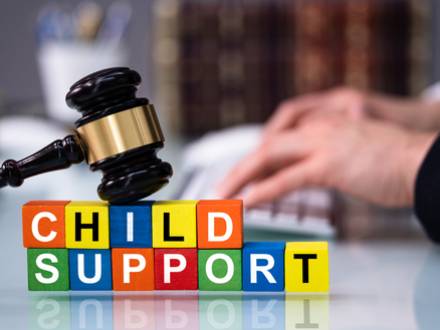Free Initial Consultations
 630-580-6373
630-580-6373With offices in Naperville, Joliet, Wheaton, Plainfield & Chicago
 Concerns about how child support money is used can create serious tension between co-parents. You want to know that your payments are truly helping your child, not being wasted or mismanaged. Illinois courts recognize this concern, but they also protect a parent’s discretion to manage their household. If you have concerns about how support is being used or enforced, our Wheaton, IL child support lawyer can explain how the law applies to your situation.
Concerns about how child support money is used can create serious tension between co-parents. You want to know that your payments are truly helping your child, not being wasted or mismanaged. Illinois courts recognize this concern, but they also protect a parent’s discretion to manage their household. If you have concerns about how support is being used or enforced, our Wheaton, IL child support lawyer can explain how the law applies to your situation.
Under 750 ILCS 5/505, child support in Illinois is meant to cover all the reasonable and necessary costs of raising a child. This includes essential needs such as:
Housing and utilities
Food and clothing
Education and school supplies
Health care and medical expenses
Transportation and child care
Courts understand that raising a child involves shared household costs. Rent, groceries, and electricity keep the child safe and healthy, even if they also benefit the parent. Illinois law gives the receiving parent flexibility in how to manage the money, as long as it supports the child’s general well-being.
If you suspect that your ex is using child support inappropriately, you must show evidence that the spending is harming the child or failing to meet their needs before the court will intervene.
As of late 2025, there is no general legal requirement for the receiving parent to prove how the funds are spent. Parents are not expected to provide itemized records unless a judge specifically orders it. This only happens when there is a documented reason to believe the child’s needs are not being met.
Once you make your payments, the receiving parent decides how to use the funds. The law presumes that they spend the money for the child’s benefit. However, if your ex is consistently behind on bills, neglecting the child’s basic needs, or using funds for nonessential personal expenses, the court may take action. If your child is lacking adequate food, clothing, or medical care, you should speak with an attorney right away. Even in these cases, the court’s primary goal is not to punish the parent but to ensure that the child is properly supported going forward.
You can request that the court review your ex’s spending, but courts are cautious about stepping into household spending disputes. To request a review, you must show evidence that the money is not being used for your child’s benefit. This may involve filing a motion in family court and presenting documentation of neglect or misuse.
The court may take notice if schools or doctors repeatedly report unpaid expenses or if there are signs that your child is living in unsafe or unstable conditions. These issues can indicate that the funds are not being used to meet your child’s essential needs, which may justify further court involvement.
If the court finds that your concerns are valid, it can take steps to ensure the money is used properly. The judge may order an accounting where they require your ex to show how they spent the money. In some cases, the court may also change how payments are made. For example, they can require that certain expenses, like school tuition or medical bills, be paid directly to the provider or that funds be specifically allocated for your child’s needs.
In some cases involving child support or custody disputes, a guardian ad litem (GAL) may be appointed to represent the child’s best interests. They investigate the situation from a neutral standpoint and make recommendations to the court.
The GAL is not on either parent’s side. Instead, their role is to make sure the child’s needs are being met. You can tell the GAL is fulfilling their duty if they ask questions about your child’s daily life, school, and emotional well-being. They may also visit your home and your ex’s home or speak with teachers, relatives, or medical providers.
If you feel that the GAL’s findings are unfair or incomplete, you can discuss your concerns with your attorney. Your lawyer can help you provide additional information, challenge errors, or request that the court review the GAL’s recommendations.
If the court finds that support funds are being misused, it may modify the order. Either parent can also request a review if circumstances have changed. Under 750 ILCS 5/510, you can file for a modification if your income shifts significantly or if the child’s needs change. The court will review both parents’ finances to decide whether the payment amount or method should be adjusted.
Even when misuse occurs, the court will avoid reducing support if it would hurt the child financially. The focus stays on protecting the child’s stability and access to necessary care.
While Illinois law does not provide an official tracking system, you can use several practical methods to promote transparency:
Use a co-parenting app to record shared expenses and communication.
Pay major bills like tuition or medical costs directly to the provider.
Keep detailed records of all payments, bank transfers, and messages.
Request mediation if disputes continue.
Ask your attorney to include spending expectations in your parenting agreement.
These steps encourage cooperation and help avoid future misunderstandings. If your ex refuses to discuss spending or if the child’s needs are being neglected, your lawyer can help you request a court review or modification.

At Davi Law Group, we are committed to protecting families through clear communication, practical solutions, and strong legal advocacy. Attorney Dion U. Davi can offer deep insight to family law matters, having served for several years as an Assistant State’s Attorney in DuPage County. His experience in the courtroom allows him to handle complex child support and custody cases with compassion and professionalism.
If you are facing concerns about child support spending or enforcement, schedule a free consultation with our Wheaton, IL child support lawyer today.
